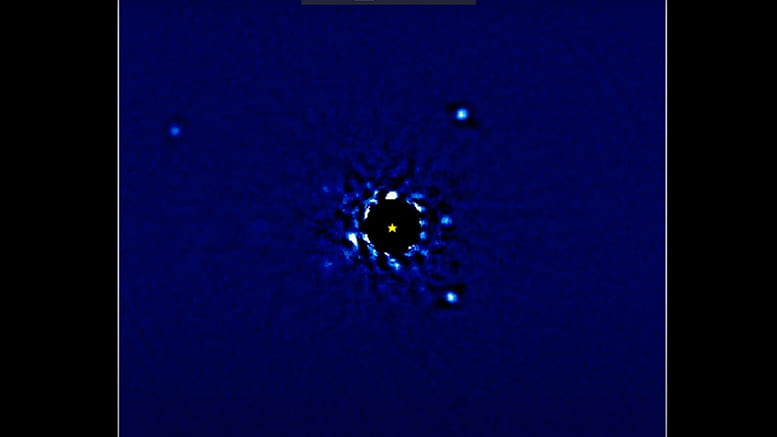Stunning new time-lapse video shows 12 years of exoplanets orbiting their star
February 7, 2023

Astrophysicist Jason Wang of Northwestern University has unveiled a new time-lapse video of the HR8799 planetary system. The first extrasolar planetary system to be directly imaged in 2008, HR8799 boasts four Jupiter-sized planets that orbit its star.
“It’s usually difficult to see planets in orbit,” Wang said. “For example, it isn’t apparent that Jupiter or Mars orbit our sun because we live in the same system and don’t have a top-down view. Astronomical events either happen too quickly or too slowly to capture in a movie. But this video shows planets moving on a human time scale. I hope it enables people to enjoy something wondrous.”
Watch the time-lapse video below of the HR8799 planetary system:
An expert in exoplanet imaging, Wang is an assistant professor of physics and astronomy and a member of the Center for Interdisciplinary Exploration and Research in Astrophysics (CIERA).
Located 133.3 light-years from Earth in the Pegasus constellation, HR8799 is considered part of our “solar neighborhood.” This compact star is 1.5 times more massive and five times more luminous than our sun, and is much younger at 30 million years old.
Since HR8799 made history as the first directly imaged planetary system in 2008, Wang has been studying it with great interest. He and his colleagues have been observing the system annually at the W. M. Keck Observatory in Hawaii for the past 12 years, and the new video is a compilation of the data collected.
The updated time-lapse video, with 12 years of imaging data, gives viewers an unparalleled look into planetary motion in just 4.5 seconds. Wang’s work is a testament to his expertise in exoplanet imaging and his dedication to uncovering the mysteries of the universe.
Learn more in Northwestern Now’s article, “Watch distant worlds dance around their sun.”
Science & Technology

Northwestern accelerates quantum research with NVIDIA technology
September 19, 2025
NVIDIA code could help researchers tackle computationally demanding tasks hindering quantum research Northwestern University physicists are using NVIDIA technology to tackle the computationally demanding tasks hindering quantum research. Northwestern theoretical physicist Jens Koch and his research group…

CRISPR’s efficiency triples with DNA-wrapped nanoparticles
September 18, 2025
New system delivers CRISPR machinery more safely and effectively into cells With the power to rewrite the genetic code underlying countless diseases, CRISPR holds immense promise to revolutionize medicine. But until scientists can deliver its…

Passion for the planet: A new generation of environmental stewards starts here
May 29, 2025
Over the last two decades, the Weinberg College-housed Program in Environmental Policy and Culture (EPC) at Northwestern has embraced the humanities and social sciences and cultivated a new generation of environmental stewards. Growing up in…

Northwestern receives $25 million gift to advance adolescent mental health research
May 16, 2025
New institute will study psychology of emerging adults, leading to innovative wellness programming for students at the University and beyond Northwestern University is launching the Institute for Adolescent Mental Health and Well-Being, an interdisciplinary initiative…



